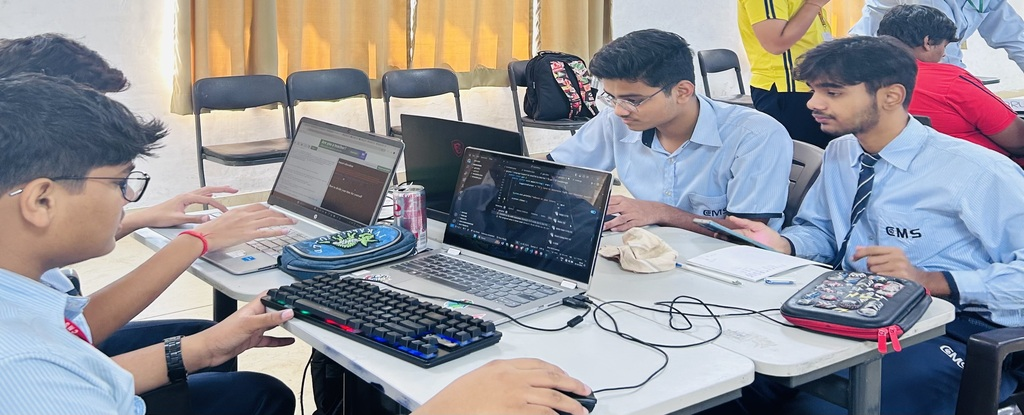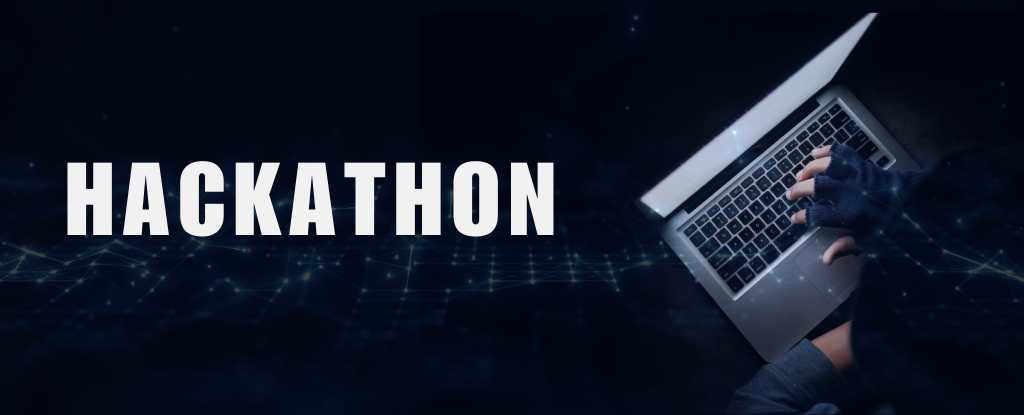Objectives and Preparation for Hackathon:
The Hackathon symposium aimed to cultivate an environment where participants could apply coding skills to solve real-world challenges. With Smart Education as the focus, participants developed solutions to simplify learning, improve educational accessibility, or enhance teaching methodologies.
The organizing committee, led by Satveek Gupta, our Grade 11 student, worked tirelessly for one month to ensure smooth execution. Promotions were done through school assemblies, social media, and posters. A clear and transparent communication was maintained with participants regarding rules, terms, and conditions.
From securing mentors and judges to managing logistics, every detail was carefully planned.
Participants and Teams:
The hackathon saw participation from teams of 2 to 4 members, each bringing their unique blend of skills to the table. The teams included students with expertise in frontend and backend development, UI/UX design, database management, and cloud computing.
Many participants were part of coding clubs, while others were beginners who were eager to learn and challenge themselves. The diversity in skills and experience levels created a vibrant and collaborative environment throughout the day.
Event Schedule:
The day began with an opening ceremony, where our respected Senior Principal Mrs. Jyoti Kashyap and Principal Ms. Shivani Singh spoke about the importance of technology in modern education and how it plays a pivotal role in shaping the future of learning.
The hackathon was then divided into two coding phases:
Each phase allowed participants to work on their projects while receiving guidance and mentorship from industry professionals and technical experts. The mentors provided invaluable support, helping teams refine their ideas, debug their code, and navigate challenges during the event.
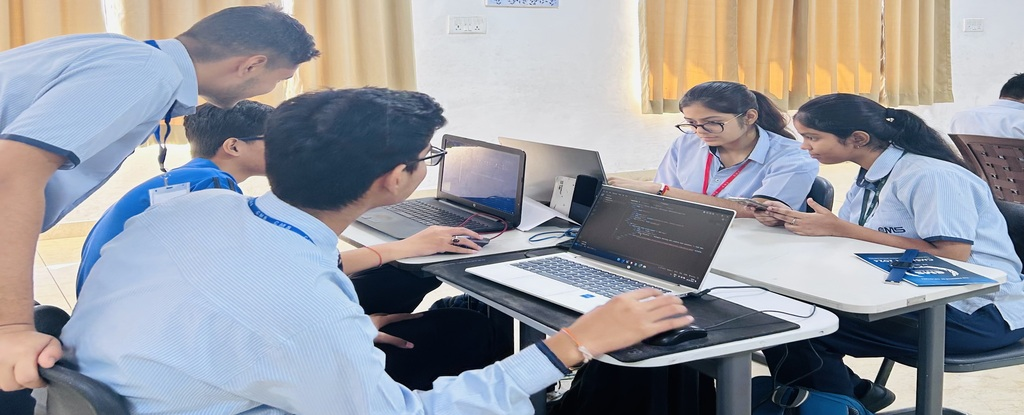
Project Highlights:
Standout projects included:
1. Interactive Learning Platform:
A gamified learning website and app designed to make subjects like mathematics and science more engaging for students. The platform featured quizzes, leaderboards, and rewards to motivate users to learn in a fun and interactive way.
2. AI-Based Tutoring System:
A personalized learning experience that adapts to students’ strengths and weaknesses, offering tailored learning materials and suggestions to improve performance. The AI tutor used machine learning to provide real-time feedback to students.
3- Virtual Classroom Management Tool:
A tool designed for teachers to track student engagement, measure participation, and analyze performance during online classes. This tool helped educators assess how effectively they were reaching each student in a virtual environment.
4. Resource Finder for Underprivileged Students:
An app that connects students from low-income backgrounds with free or affordable educational resources, including textbooks, online courses, and tutoring services. The goal was to bridge the education gap by providing access to essential learning materials.
Judging and Evaluation:
A panel of experienced judges, including educators, industry professionals, and tech experts, evaluated each project based on several criteria: innovation, technical complexity, presentation, relevance to the theme, and real-world applicability. The judges thoroughly reviewed each project and provided constructive feedback to help the participants improve their ideas and implementations.
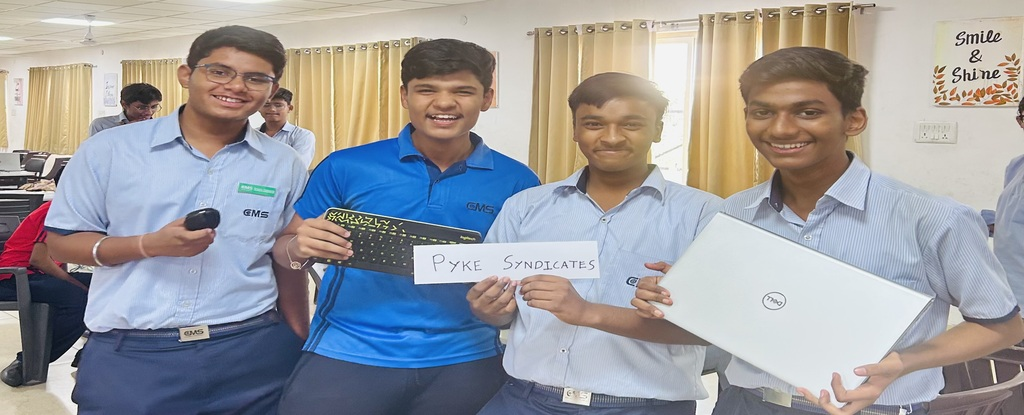
Awards and Recognition:
The event concluded with an exciting awards ceremony where the top-performing teams were recognized for their hard work and innovative solutions. The winners were as follows:
1.First Place: Binary Codebreakers and Pyke Syndicates (240/300 points) – Both teams showcased extraordinary technical skills and innovative solutions. Binary Codebreakers created an AI-based personalized learning system, while Pyke Syndicates developed a gamified platform that motivated students to learn through interactive challenges.
2.Second Place: 404 Not Found (230/300 points) – Their project, a collaborative resource-sharing platform, allowed teachers and students to upload, share, and access study materials, tutorials, and lessons.
3.Third Place: The Decepticons (222/300 points) – Their project was a virtual classroom management tool that enabled teachers to monitor student engagement and performance, enhancing the effectiveness of remote learning.
4.Consolation Award: Code Enigma (219/300 points) – Their resource-finder app aimed to provide underprivileged students with easy access to free or low-cost educational resources, making learning more accessible.
All the winning teams received certificates, medals, and gift vouchers. They were also awarded exclusive mentorship opportunities to help further develop their projects and explore potential real-world applications.
Feedback and Reflections on the Hackathon:
Participants expressed great satisfaction with the structure and execution of the event. They appreciated the opportunity to collaborate with like-minded individuals and learn from industry mentors.
The feedback sessions provided valuable insights into areas of improvement, helping participants refine their coding and presentation skills. The judges’ comments were instrumental in helping the participants recognize the strengths and potential areas for growth in their projects.
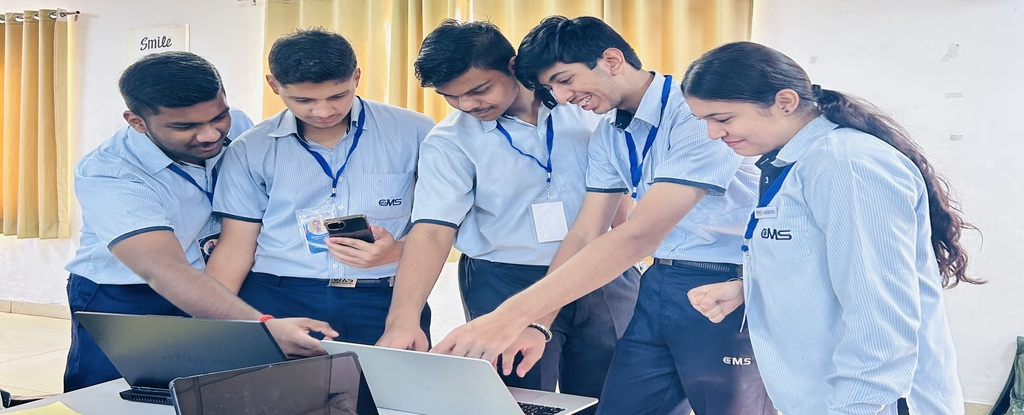
Hackathon: CircuitSphere Symposium demonstrated technology’s potential to revolutionize education. It provided students with opportunities to explore ideas, experiment with tools, and develop real-world solutions. Beyond coding, participants learned teamwork, creativity, and perseverance.
Next Step:
Plans for next year’s CircuitSphere Symposium are already underway, with the intention of introducing more advanced challenges, tools, and resources for participants.
The organizing committee aims to build on this year’s success and continue fostering a culture of innovation, creativity, and collaboration in the tech community.
By providing students with the resources and opportunities to work on cutting-edge projects, the CircuitSphere Symposium has set a strong foundation for future hackathons, inspiring young minds to pursue careers in technology and create meaningful solutions for the world.
